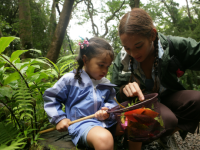Reconnecting Adults With Playful Learning
Creativity and self-expression are the keys to helping adults understand how playful learning can enrich the experience of the children in their world.
Your content has been saved!
Go to My Saved Content.K-12 education has historically been designed around core academic subjects like math and English, with play as a secondary activity that's shoehorned into recess and after-school activities. We've made a commitment to uncovering some of the research and stories that make a case for bringing more play into the classroom.
Indeed, educator-innovators like Ashoka Fellow Vishal Talreja argue that incorporating playful learning into their trainings with educators is a very practical approach. It has helped them achieve major turnarounds in the quality of education, making the learning process more engaging to help young people pick up the life skills they'll need to succeed in the classroom and beyond.
Talreja and his staff have designed the Dream a Dream program in Bangalore, India to teach life skills, including leadership, to more than 50,000 underprivileged young people under 18 by making it fun and experiential, creating learning moments through arts, sports, and more. As a result, 65 percent of the young people in Dream a Dream's after-school program show a life skills improvement from one year to the next, and 90 percent of the school teachers who have been trained by the program report that they understand children better and are more empathetic toward them.
One of the key elements of Talreja's approach to learning through play is ensuring that "youth are challenged with something new, within a space of discovery, so that they are automatically engaged, having fun and learning," he said. He believes that providing highly experiential activities is critical -- they help adults explore their inner child and unlock the creative potential of teachers.
Here are three activities that Talreja, and others around the world, have successfully incorporated into their sessions with hundreds of teachers, childcare providers, parents, and youth volunteers.
Adult Activity #1: Unlock Creative Potential by Drawing a "River of Life"
Ask adult participants to imagine their lives as a river, starting from the time they were born, and to chart its ups and downs. They might consider drawing hardships as boulders, waterfalls to illustrate major challenges, or bridges over roaring water as support networks. After participants have painted or drawn their own free interpretations, have discussion facilitators create a space for group sharing. The goal of the activity is to recognize the creative potential in teachers, celebrate their uniqueness, and invite them to bring empathy into the learning space for each other's life journeys, so that they can do the same for their young people.
For more information about how Dream a Dream's life assessment has proven to be a simple yet reliable measure of life skills for disadvantaged and developmentally different young people in the developing world, check out the recent peer-reviewed research paper in Social Behavior and Personality journal. The tool measures progress on six life skills:
- Decision making
- Problem solving
- Communication and interpersonal skills
- Self-awareness
- Empathy
- Ability to cope with emotions and stress
Adult Activity #2: Express Yourself!
Behavioral problems often manifest themselves between ages three and six, becoming embedded by age eight, which is why PAPILIO founder Heidrun Mayer, who trains educators in Germany through a social franchise model, recommends that parents and teachers support healthy development in age-appropriate ways.
"Developmental psychology teaches us that children have to learn social-emotional competences at an early age in order to develop their own identity and sense of self-worth," Mayer said. "This is beneficial for their ongoing development. Later on, it's very hard to correct or make up for whatever has [never been taught] or has been taught in a wrong way."
Mayer suggests using stories or simple toys like puppets to help children recognize the four key emotions in others: happiness, sadness, anger, and fear. By making emotional literacy a part of children's daily routines, you'll encourage young people to share their feelings and temper their frustrations. The long-term benefits include reducing aggressive and violent behavior and improving resiliency, empathy, and conflict-resolution skills.
To set up a similar program in your school or community, Mayer suggests three things:
- Plan and organize your system in a way that allows you and your kids to work toward positive social-emotional development every day -- that's the key to sustainability.
- Standardize trainings for educators and adults, and keep track of progress to inform regular feedback discussions.
- Set up an onsite network ("train the trainer" workshops are helpful).
Hundreds of parents, teachers, and children have reported that PAPILIO's programming builds more friendly and respectful learning environments.
Adult Activity #3: Adult Recess Time
Who hasn't been at a conference and felt a rapid energy drain right around mid-afternoon? Try out a technique tested by Kjartan Eide of Trivelsprogram and Jill Vialet of Playworks: add a mid-afternoon recess for the adults! Assign a few participants to lead pre-selected games that serve as an opportunity to teach deeper lessons concerning cooperation, communication, and well being.
When teachers and administrators saw the value of recess and brought more effective recess programs to their schools, they saw marked improvements in their students' ability to learn. Adoption of Kjartan's approach led to more than 69 percent of teachers reporting that student conflict has decreased in 1,000 schools in Scandinavia; and Vialet found that 89 percent of U.S. staff reported that 185,000 students had an increased ability to focus on class activities.
(The downloadable game guide by Playworks and an upcoming guide about playful learning by Trivelsprogram can inspire the types of games you select.)
Is play a component in your professional development? Please tell us how it works -- or how it could work.
